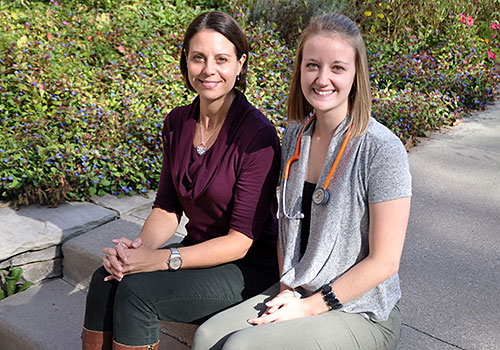
Patient simulation is commonly used in medical and veterinary programs to teach students how to work with clients, but hiring actors to portray patients with various health conditions can be costly.
To give her nutrition students a realistic patient experience, Prof. Andrea Buchholz, Family Relations and Applied Nutrition, contacted Prof. Alan Filewod, director of the School of English and Theatre Studies, to find out if any theatre students might be interested in participating in mock nutritional counselling and physical assessment sessions. The student actors were offered an academic credit in exchange for their participation.
Kaitlyn Vanderleest was an undergraduate nutrition student at U of G the first time student actors were used in patient simulations in winter 2015. Now she’s doing her master’s degree on the topic of patient simulation as an educational tool. Another group of theatre students will act as patients in winter 2016.
“Working with the theatre students was incredible. They were so dedicated to their characters that they made the experience feel very real,” says Vanderleest. “It’s such a great way to get risk-free, safe, hands-on skill training before entering into the real world and using these skills on real patients.”
After consulting with theatre studies professor Ann Wilson, who taught the course in which the theatre students were enrolled, Buchholz learned that some theatre students become actors for training videos instead of working on stage, television or movie productions. “It actually ended up being very job relevant for them,” says Buchholz.
After each patient simulation session, the nutrition and theatre students discussed what went well and what didn’t. Theatre students learned how to improve their acting, while nutrition students learned how to strengthen their communication and physical assessment skills.
Vanderleest says she found the simulation experiences and immediate feedback more effective in enhancing her understanding of the course material instead of reading a textbook without having the opportunity to practice the skills being taught.
Student feedback has been extremely positive, says Buchholz. In one course evaluation, a student said she was initially nervous about interacting with the theatre students but as the semester went on, she felt more confident. “The labs with the standardized patients also provided an excellent opportunity for us to apply our theoretical knowledge into practice,” wrote one student. “I found the debriefing period, especially the feedback from the standardized patients, very useful in helping us improve on our practical skills.”
Working with Prof. Alexia Prescod, also in Family Relations and Applied Nutrition, the theatre students also acted as simulated patients for master of applied nutrition students, who practiced their counseling skills on patients with different personality types. Some of the actors portrayed patients who were argumentative or depressed. An important skill for students to develop, says Buchholz, is “How do you deal with an emotional breakdown in your client when it’s happening right in front of you in your office?”
Undergraduate nutrition students were tested on their physical examination skills, while master’s students practiced their counseling skills. In both cases, students developed their communication skills, which are applicable to any type of job, says Vanderleest.
Buchholz met with the theatre students a few days before each “performance” and assigned them personality traits and physical attributes specific to the disease condition they were trying to portray. “They came up with their own ideas around costume and makeup,” she says, adding that she was impressed by how realistic the students tried to be.
One student, for example, used topical anesthetic to temporarily numb one side of her face to mimic facial paralysis in a stroke patient. Part of the physical assessment involved asking the patient to drink water from a glass, which trickled down her face.
“The fact that the theatre students went to such extremes to make the experience feel as real as possible was so great because now when I’m working with stroke patients in the future, I have a better idea of what to expect,” says Vanderleest.